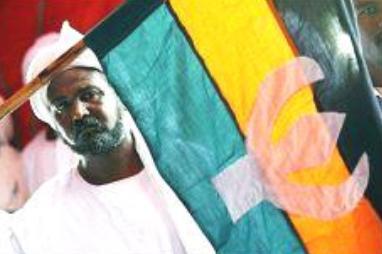Sudan’s Umma party faction pulls out of government
KHARTOUM, Dec 13 (AFP) — The Umma Party for Reform and Renewal has withdrawn from the government of Sudanese President Omar al-Beshir, ending a two-year alliance, party officials said.

|
|
A Sudanese supporter of the main opposition party Umma holds a flag during a press conference on the Darfur crisis. (AFP) |
UPRR deputy leader and Information Minister Al-Zahawi Ibrahim Malik said 14 party members serving in various capacities in the federal and state government had tendered their resignations.
The party, an offshoot of the mainstream Umma Party of former prime minister Sadiq al-Mahdi, quit after claiming that the ruling party had violated a political agreement governing their two-year partnership, Malik said.
Malik said four of the party’s six ministers in the federal government have confirmed they would comply with the decision to withdraw.
The UPRR broke away from the Umma Party, the largest of Sudan’s traditional political groups that led the march for independence from British rule, after differences between Mahdi and his cousin Mubarak al-Fadil al-Mahdi.
Its emergence provided the government with an ally after the fallout between Beshir and his chief ideologue Hassan al-Turabi, and allowed the regime to claim a semblance of political plurality in the country.
The UPRR’s split from the mainstream Umma also weakened political opposition against Beshir, which was mobilizing international support against the regime and calling for its ouster.
Two senior UPRR officials later on Monday declared opposition to breaking up the party’s political and executive partnership with the ruling National Congress Party and opted to retain their government offices.
Presidential advisor Ali Hassan Tajedine and State Foreign Minister Naguib al-Khair Abdel Wahab were cited by SUNA news agency as saying they would not desert the government while the country was heading for peace, during peace talks in Naivasha, Abuja and Cairo with rebels.
Abdel Wahab said continuation of alliance at this time of efforts to end war and reach peace “is an important duty before which partisan interests are dwarfed.”
The State foreign minister, who is taking part in Abuja negotiations with Darfur rebels, was quoted by SUNA as saying he could not share the decision by his colleagues for ending the partnership, terming it “unwise, illogical and unjustified”.
